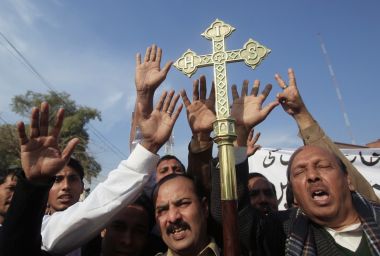Pakistan: Christians join Muslims in protests against Charlie Hebdo

Christians in Pakistan have joined Muslims in protests against cartoons in the Charlie Hebdo satirical magazine whose Paris offices were attacked by Islamist extremists.
Twelve people died in the magazine attack on 7 January, which resulted in the deaths of the brothers responsible, Cherif and Said Kouachi.
The largest protest was in Lahore, in eastern Pakistan, where more than 10,000 protesters chanted "Down with Charlie Hebdo" and "Death to blasphemers". The leader of the hardline Jamaat-ud-Dawa party, Hafiz Mohammad Saeed, urged Muslim leaders to convince the United Nations that it should declare any form of blasphemy an international crime.
"If the United Nations doesn't pay any heed to it, then Muslim states should form a United Nations of their own," he said. Another group gathered in front of the Lahore Press Club to pay homage to the Kouachi brothers who conducted the attack. Among signs praising them was one saying: "A strong message was needed and they delivered it. We salute the messengers... may they live long."
In Peshawar, where in 2013 a twin suicide bomb at All Saints Church left 127 people dead and more than 250 injured, around 100 Christians said to be members of the United Christian Movement political party also demonstrated against the magazine, burning the French flag and demanding that the paper be banned.
In the southern Pakistan city of Karachi police used teargas and a water cannon against demonstrators outside the French consulate.
In France, an outpouring of national mourning was capped with the issue of a special international edition of the paper with Mohammed on the front. Around 5 million copies sold out instantly, with the magazine's lawyer and spokesman, Richard Malka, saying: "We are not giving an inch. The spirit of 'Je suis Charlie' also implies a right to blaspheme."
The Saudi Arabia-based Organisation of Islamic Cooperation (OIC) is planning to sue Charlie Hebdo following the publication. In Saudi Arabia, the former culture minister Iyad Madani, now head of the Jeddah-based OIC, said it was "an idiotic step that requires necessary legal measures".
The announcement came as demonstrations against the image on last week's "survivor" issue turned violent in Niger, Pakistan and Algeria, with up to 10 deaths.











